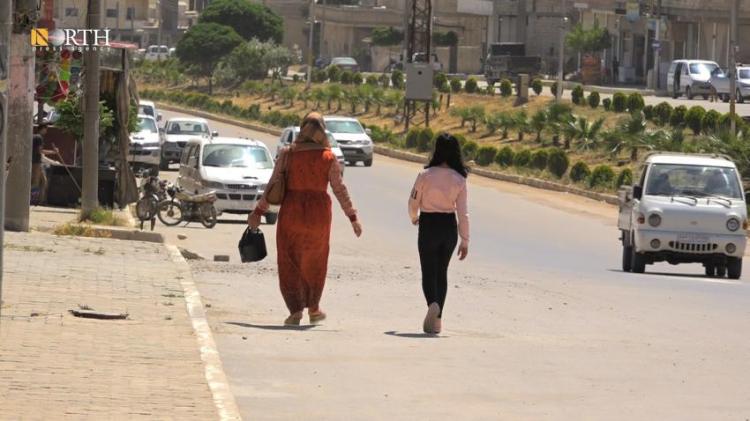Kobani – North-Press Agency
Fattah Issa
This year, Eid al-Fitr passes while the IDPs from the Tel Abyad and Serekaniye (Ras al-Ain) regions suffer from difficult living conditions far from their houses, villages, and their cities, where some describe the holiday atmosphere as "flavorless" because they are away from their friends, relatives, and neighbors who “scattered like a handful of chickpeas" in several areas in northeastern Syria.
Haji Mahmoud Khalil, from Qazali village in the western countryside of Tel Abyad, said that he did not feel the joy of the holiday, while he is far from his village, family, and relatives who live in semi-deserted houses in the southern and eastern countryside of Kobani.
"I couldn't buy clothes for my children because of high prices. The bad conditions we are living in are due to Turkey and its affiliated groups that occupied our land,” he added.
On October 9th, 2019, Turkey, along with its armed opposition groups, launched a ground and air offensive on the northeastern regions of Syria that ended with their occupation of the areas of both Tel Abyad (Gre-Spi) and Serekaniye (Ras al-Ain), which caused the displacement of more than 300,000 people, according to the statistics of the Autonomous Administration of North and East Syria.
Khalil added that they left their land, their village, their property, and their agricultural lands that they cannot harvest due to the war. "Our hearts are burning with grief over what happened to our village; we cannot go to it because of the Turkish forces and their affiliated groups,” he said.
He pointed out that they are living in tragic conditions in Kobani, saying: "Everyone is occupied by the exchange rate of the dollar, high rent prices, and the rise in food prices. The living situation for us is bad."
When Khalil arrived in Kobani about eight months ago, he rented a house with SYP 250,000 annually, but the owners of the house are now asking him for SYP 500,000 as annual rent, which will be an even heavier financial burden.
Markets in the cities and regions of Syria are recently witnessing a large increase in prices due to the sharp fall in the Syrian pound against foreign currencies, especially the US dollar, about a month ago, as the exchange rate was recorded in the city of Kobani on Tuesday at SYP 1,730 against one dollar.
Ahmad Jassem Rasoul, a father of ten from Tel Fender village 5 km west of Tel Abyad, pointed out that they did not feel the atmosphere of Eid al-Fitr in light of their displacement and their distance from their land and village, as well as the high prices of holiday needs such as clothes and sweets.
During the Turkish offensive on the area, more than 100 people displaced from the village of Tel Fender took refuge in several places in Raqqa, Hasakah, Derik and Kobani, according to what Rasoul reported.
Before Turkey and their opposition groups took over his village, like other villagers, Rasool was working in agriculture, "but now we are unemployed and our living conditions are bad."
Visit the graves
Rasoul tries to look back a little to how they celebrated the holiday with their relatives and families in the village, where they exchanged visits and went to the village cemetery in the morning of the first day of the holiday, "but on this holiday, I cannot visit the graves of my father and my mother because the area is under the control of the militants.”
Muhammad Saleh Rashid, from Zaradasht neighborhood in Serekaniye (Ras al-Ain), now lives outside his city for the first time. He said: "The atmosphere of the last Eid al-Fitr was better for me, as I was with my friends in my city.”
"All of my friends have been displaced and each one of them is living in a different area after the Turkish occupation forces bombed our area. Some of them live in the Kurdistan Region of Iraq, others in Hasakah, some of them in Qamishli, while I live in Kobani,” he added.

